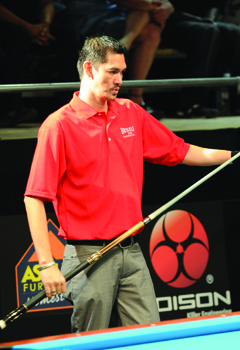|
|
Current Issue
Previous Page Page 3 Next Page
>
The Real World
 |
| Alcano led a strong contingent of Filipino players. (Photo by Justin Collett) |
RIC JONES, owner of Bad Boys Billiard Productions, still sounds weary during our phone conversation - even though the tournament concluded more than a week previously. "Running the Galveston tournament was mentally tougher than running the BCA Nationals," he tells me, almost sighing. His company was brought in at the 11th hour to help bring order from the chaos. But so much was going wrong. "I [told them] that if you're going to do this in the future, you need to sit down and figure this stuff out," he said.
Take, for instance, the amateur events. Taylor Road promoted a $50,000 top prize for the "amateur" team 8-ball competition. Not surprisingly, this attracted action players from coast to coast, real hardened road warriors, and they showed up in droves asking whether they could sign up. "But, hey, if they're asking, then they know they shouldn't be [included]," said Jones. "But the poor ladies [in the front office] didn't know."
Out of 36 teams in the 8-ball event, about five or six were clearly stacked, said Jones. Of the 171 players in the individual 8-ball men's amateur event, between 40 and 50 were not really amateurs, he said. Jones acknowledged that part of the problem was one that's not uncommon elsewhere - that there are a lot of players who are so-called "masters" or "grand masters," but who are not on the BCA master list and are not league players. They fly under the radar. But part of the problem in Galveston also was a lack of foresight, he said.
There was also the question of the TV deal. The promoters in August put out a press release noting that Versus, a sports cable network, would air five one-hour shows from Galveston, scheduled to begin Nov. 11. But one of the organizers acknowledged during the event that ongoing technical difficulties could keep the programming off the air. There's still no word whether the broadcast is on or off, though Vickio claims Versus had not returned a contract.
But the biggest potential problem - the one that could have resulted in mutiny and sedition - was the smaller-than-promoted first-place awards. What staved off disaster for Taylor Road was the fact that the company put in plenty of added money, despite the low attendance, and that the players themselves voted to redistribute it. "They haven't done anything they didn't say they were going to do, and so I'm very, very happy," said Archer, who placed second in the 8-ball segment. "They could have definitely made a big stink about the attendance, and [how] the money wasn't there, but they didn't. So that holds a lot in my book."
Consider the math. In the 10-ball event, Taylor Road promoted a first place award of $50,000. The entry fee was $600. Had all 256 available slots been filled, Taylor Road would have easily collected enough to fund the top prize, plus have enough left over to spread money throughout the field. (Multiplying 256 by $600, and you come up with $153,600.) In reality, however, only 75 players entered the 10-ball event, which brought the total amount of entry fees down to $45,000. That's not enough to fund the top prize - much less other prizes. So Taylor Road added $22,000 to the event to make sure there would be enough for the $50,000 first-place award, plus a little extra, and the players themselves voted to trim first prize down to $25,000 and redistribute the rest down the field.
In total, the $272,500 in prize money included $76,100 added by the promoters. But due to a lack of participation, Taylor Road also cancelled a women's 8-ball event, a master's 8-ball event and reduced the top prize for the amateur team 8-ball event from a staggering $50,000 to just $9,000. The press material also promoted the Galveston World Classic as a "million dollar" event, although nowhere near $1 million in prizes were awarded.
"The million dollars would have been for full fields, as you probably figured out," said Vickio. "I don't think I should run a welfare program."
I talked to both pros and amateurs about the payouts, and most either declined to address the issue straight up or seemed OK with the decision. But there were detractors. The Action Report founder Justin Collett, who spent several days in Galveston, said Vickio & Co. promised too much and delivered too little. "What is wrong with people in this industry?" he wrote on his blog during the tournament's final days. "Yes, the promoters put on an event. Yes, they lost an asinine amount of money to do it. Yes, it was probably the best one-pocket field in the last 10 years. They deserve credit for all of those things. [But] they also need to explain beyond 'at least we did something,' why after six months of non-stop hype that when the rubber met the road [the deal] changed drastically at the last minute."
Previous Page Page 3 Next Page
>
Top |
|





